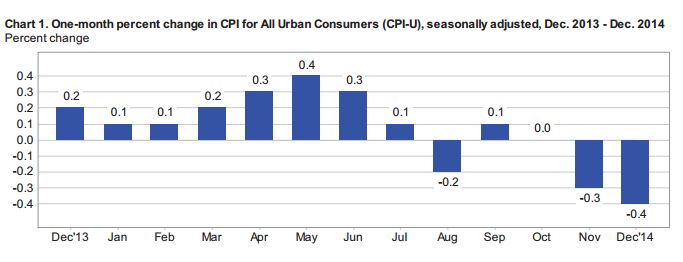The price of consumer goods last year rose at their slowest pace during an economic growth spurt in U.S. history; a trend that economists say has great implications on the U.S. Federal Reserves’ plan to end its stimulus program.
Prices rose just 0.8 percent last year and actually declined during the final two months of the year as the collapse of oil prices offset the higher cost of food and health care, the Bureau of Labor Statistics said Jan. 16.
This means that Americans are able to stretch their dollars further at a time when wages in the U.S. are slow to rise as well. But many economists fear that it’s also a warning sign that the economy remains far from good health.
The Fed likes to keep the inflation rate around 2 percent, which is more than double that of last year’s, to act as a buffer against economic shocks. The data will likely shine new light on the Fed’s plan to increase its benchmark interest rate, which has been at near zero percent since 2009, as early as April.
So far, the Fed has no plans to change its course and several Fed officials have blamed the slow growth on falling energy prices, which many experts predict will remain low for several months.
“There will almost certainly be weak inflation readings early in the year influenced by energy prices,” Dennis Lockhart, president of the Federal Reserve Bank of Atlanta, said in a speech this week. “But once that influence has passed, I expect inflation to move toward the Fed’s targeted longer-term run rate.”
Fed officials, however, are not alone in their view that inflation will return to its desired rate of 2 percent a year. A study of investors, consumers and economists also shows widespread support for a higher inflation rate, according to the New York Times.
“We chose 2 percent for a good reason, and that was to provide enough capacity to help buffer the economy against shocks,” Narayana Kocherlakota, the Federal Reserve Bank of Minneapolis president, said in a December interview with the newspaper. “If the inflation rate gets stuck at a low level, then we lose our ability to buffer against shocks.”
A loanDepot licensed loan officer can help with these and any other lending questions. Call (888) 983-3240 to speak with one today.
Published Jan. 16, 2015
RELATED STORIES
Fed: No interest-rate hike until April
Mortgage interest-rate predictions for 2015
How U.S. mortgage rates are established
How a borrower's mortgage rate is determined


